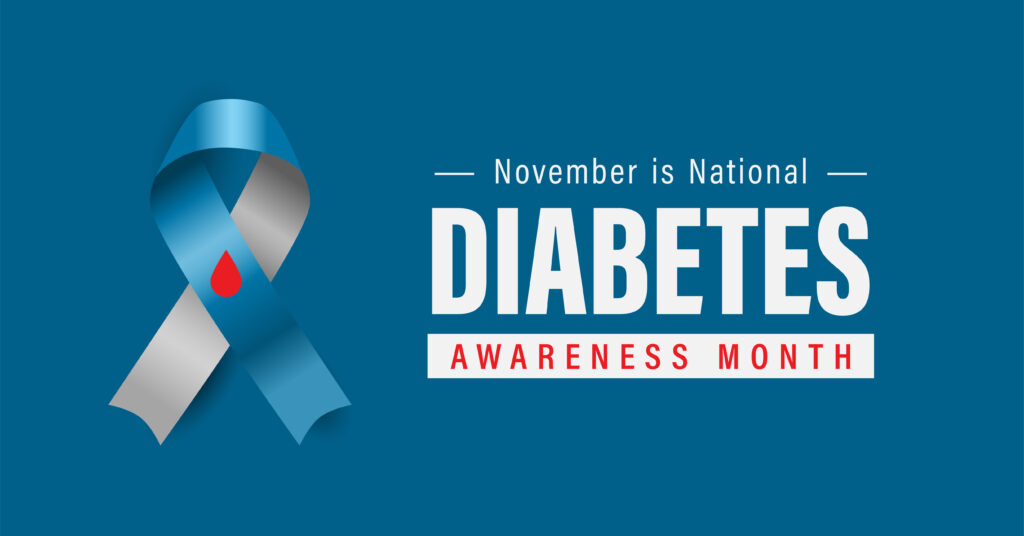American Diabetes Awareness Month

November marks American Diabetes Awareness
Month. Though it is a time to cheer on those who are battling this epidemic, it
is not meant to be a month of celebration. The main objective of American
Diabetes Month is drawing attention to the 38 million Americans
that live with this chronic disease, and to encourage people to join the fight
against Diabetes through support, advocacy and education.
Understanding Diabetes
Type 1 Diabetes: Type
1 Diabetes is an autoimmune disease where your immune system destroys the beta
cells in your pancreas. These beta cells create insulin, a hormone that helps
regulate blood sugar levels, and when the production of this hormone is halted,
blood glucose can’t enter the blood stream. This results in high blood glucose
(hyperglycemia). Type 1 Diabetes completely shifts a person’s way of life as
they need to prioritize physical exercise, follow a specific diet and meal
plan, and be prescribed insulin injections that are given two to three times a
day.
Type 2 Diabetes: Type
2 Diabetes is known as insulin resistance, which results in the inability of your
body to regulate blood glucose levels. This often effects middle-aged and older
adults but can be treated with insulin injections and lifestyle changes.
Prediabetes: People
who develop Type 2 Diabetes almost always had Prediabetes prior to the
diagnosis. This refers to when blood glucose levels are higher than they should
be, but not high enough to be considered Diabetes. Those that are diagnosed
with Prediabetes are not guaranteed to develop Type 2 Diabetes. However, they
are encouraged to make lifestyle changes like increases physical activity and a
healthy diet and meal plan to prevent the possible onset of Type 2 Diabetes.
Gestational Diabetes: Gestational
Diabetes refers to Diabetes during pregnancy. There is a significant lack
of research for Gestational Diabetes, as the exact cause has not yet been
discovered. However, experts
have assumed this happens when the placentas hormones block the mother’s
insulin. This diagnosis can be very scary for pregnant women, however, with the
right treatment plan and early intervention, it will oftentimes go away after
the baby is born.
Diabetes Complications
Though Diabetes can be treated through
lifestyle changes and insulin, it increases the risk of serious complications
for millions of Americans. According to the American
Diabetes Association, Diabetes increases the risk of:
·
Cardiovascular Disease
·
Chronic Kidney Disease
·
Diabetes-related Eye Disease
·
Neuropathy
·
Foot, skin, and oral complications
·
Hearing loss
·
Diabetes Ketoacidosis
·
Stroke
Guide to Identifying Early Symptoms:
Since the early detection and treatment
of Diabetes can reduce the risk of further complications, the knowledge of
common symptoms is vital. According to the American Diabetes Association, the
following symptoms could be possible warning signs for Diabetes:
·
Urinating often
·
Feeling very thirsty
·
Feeling very hungry even though you are
eating
·
Extreme fatigue
·
Blurry vision
·
Slow healing cuts/bruises
·
Weight loss even though you are eating
more (type 1)
·
Tingling, pain or numbness in the
hands/feet (type 2)
Resources
The American Diabetes Association and The
Center for Disease Control have developed various guides, programs, and courses
to ensure that those with Diabetes have the resources they need and know that
they are not alone. Below are a few key resources for managing healthcare
costs, getting connected with others, and prioritizing health and wellness.
Insulin
Storage Tips: The Diabetes Disaster
Response Coalition provides a list of specific tips to safely store your
insulin during a natural disaster or power outage.
Lowering
Insulin Costs: The
American Diabetes Association has curated a list of resources to assist in
lowering the costs of insulin.
Type
2 Diabetes Risk Test: Stay
in control of your health and take this 60-second Type 2 Diabetes Risk
assessment provided by the American Diabetes Association.
“Ask
The Experts” Informational Events: The American Diabetes
Association holds various virtual Q&A sessions with experts in the field of
Diabetes. Register today and get the answers you need.
Tips
for Eating Well With Diabetes: The American Diabetes
Association provides tips for eating well and managing your health with
Diabetes.
Diabetes
Self Management and Support Series: The Center for
Disease Control and Prevention created a video series detailing self-care
behaviors to prevent or delay Diabetes complications.
Live
Cooking Classes: Take a look at live cooking classes
provided by the American Diabetes Association and learn how to reach your
Diabetes management goals through healthy eating.
Ways to Contribute
Whether you or a loved one is suffering from
Diabetes, or you are learning more about the disease this month and would like
to get involved, every act of advocacy and donation helps. If you would like to
donate towards the research, programs, and advocacy for Diabetes, you can do so
here.
If you would like to make a difference
and volunteer your time to the American Diabetes Association, find the perfect
fit for your schedule and skills here
or call 1-888-342-2383.
Like this article?
Leave a comment
About Author
McKenna Cheverier is the Neighborhoods and Families Coordinator for the Department of Leisure, Family, and Recreation. She began working with the town as an intern during her senior year at UConn. McKenna completed her bachelor’s degree in Human Development and Family Sciences with a minor in Urban and Community Studies.
